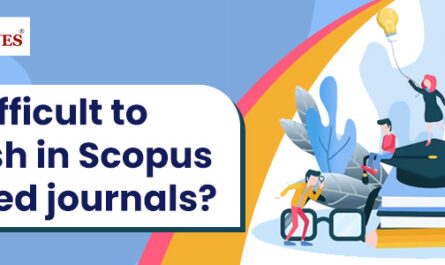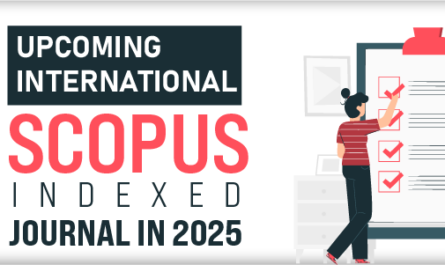Upcoming Scopus Indexed conferences India are sought after by researchers, scholars, practitioners, and those who seek to be acknowledged for their diligent innovations and most recent breakthroughs in their field of study. This is so that your work can be exhibited and provided worldwide visibility on the esteemed and respected Scopus platform, which is hosted by renowned industry professionals and organizations.
A Scopus indexed conference is a highly regarded event in the landscape of academic publishing and research. These events are considered highly prestigious because they are indexed by Scopus, which is the largest and most credible database of academic journals, conference proceedings, and books.
Despite numerous Scopus conferences in India in 2025, choose the conference based on your field of interest, the subjects covered in the conference sessions,etc. In this blog, we are going to share some great tips for choosing an upcoming Scopus conference that suits your interest and helps you grow in your field.
Keep reading to know:
Tips for Choosing a Scopus indexed conference 2025 India
Being indexed by Scopus means the conference fulfils the criteria of quality standards and promises visibility to your research work. Here are the tips for choosing a Scopus conference for you:
Visit the Conference Website to Match the Information
Although Scopus is the most reliable source of information about academic conferences, you should also visit the event’s official website. After all, the official conference website is the primary source of information and getting insights into the event’s credibility.
Below are the key things you should look for:
- Indexing: The website of the Scopus conference should clearly display the conference’s indexing details, such as whether it is indexed in Scopus or other platforms.
- Previous editions:The website should detail past events, including their key dates, venues, topics covered, keynote speakers, and more. An event with a long history is highly regarded as prestigious and credible.
- Conference proceedings: Genuine conferences allow people to access previously presented proceedings as well as published proceedings.
Analyse this information to determine whether the conference you want to attend meets your professional and academic standards.
Conference Organisers and Affiliations
The reputation of conference organisers has a huge influence on the credibility of a conference. So, make sure you thoroughly research the background of organisers. Many of these organisers often include professional educational institutions and universities, creating a reliable platform to present unique findings, research papers, and innovations.
If the organisers of a conference are affiliated with a famous university, you can trust that they will bring significant wisdom that will further help grow your career. Similarly, if they belong to well-known corporations, it could open doors to countless opportunities for gaining industry insights and building valuable business partnerships.
Similarly, conferences affiliated with credible professional organizations like IEEE often maintain the best quality standards. In addition, they have a large network of industry experts, which helps improve the event’s academic value to the next level.
So, in simple words, look for organizers’
- Background
- Academic and professional experience
- Contributions to their fields
- Partnerships or sponsorships
Check Reviews and Testimonials
Reading feedback from past conference participants can be very helpful. It provides true and practical insights into organizers, quality, and the experience of the conference you are planning to attend.
So, check out reviews and testimonials on academic forums, professional networks, and social media groups. These reviews can be negative or positive, with positive reviews emphasizing insightful sessions, presentations, and networking opportunities. Negative reviews emphasize issues like low attendance, inadequate organization, and insufficient academic rigour. By checking out these reviews, you can make informed decisions when choosing a Scopus conference India.
Assess Submission Guidelines
Credible and prestigious academic events maintain total transparency. So, they provide clear and detailed submission guidelines, including instructions on submission deadlines, presentation formats, paper formatting, etc. This results in uniform submissions according to the conference’s standards, thus easing the review process.
Moreover, the rigorousness of the peer-review process indicates the reputation of the conference. This process involves field experts who review submitted research papers for plagiarism, quality, relevancy, meaningfulness, and more.
For Scopus conferences in India 2025, you can find complete submission guidelines on the conference website. Check whether the process involved a double-blind review, which means the authors and the reviewers remain unknown to each other. This results in a fair and impartial review process. Additionally, check if it involves multiple rounds of reviews and revisions. In this process, authors can answer the comments of reviewers and make necessary revisions to meet high academic standards.
Carefully assessing submission guidelines of submission guidelines and the peer-review process helps determine the event’s commitment to quality and integrity.
Assess the Scope and Relevance
Does the theme and topics of the Scopus conference 2025 India address your research interests and study area? A conference that fits your interest provides valuable knowledge that can take your career to the next level.
In addition, a relevant conference brings meaningful networking opportunities because such events are attended by peers and experts in your field. So, you will find many opportunities for valuable connections, collaborations, partnerships, and co-authorship.
Presenting at a relevant conference captures attention from researchers and practitioners interested in your topic and findings. This can strengthen your academic profile and lead to the advancement of your research area.
Compliance with Scopus Indexing Requirements
Conferences that are compliant with Scopus indexing requirements are known for maintaining high academic integrity and quality.
So, look for the following things:
- Time submission of proceedings ensures that your research becomes prompt accessible, bringing visibility to your work faster. Delays or failure to submit proceedings could indicate organizational inefficiencies.
- A reputable conference sets up proper citation practices and all papers have to follow these practices to meet essential academic standards. This helps avoid plagiarism issues and ensures that your work is properly indexed and accessed through Scopus.
- Review the conference’s history for Scopus indexing because a Scopus indexed conference is more reliable than other ones. Check the official website for the event’s indexing status and compliance with Scopus standards. Conferences compliant with Scopus indexing requirements indicate your research will be part of a reputable academic repository.
Availability of Technical Support
The availability of technical facilities for presentations can have a huge impact on your and your peers’ overall experience. Proper technical support ensures that your presentation runs without interruptions due to potential technical glitches.
Essential technical facilities that should be available at a Scopus indexed conference include audio-visual equipment, presentation software, and stable internet connection for effective communication.
In addition, ask about knowledgeable and responsive on-site technical support staff to address any potential issues during presentations. This can range from helping with equipment setup to resolving technical issues right away.
The infrastructure of the venue also matters. Make sure the conference rooms are well-equipped with comfortable seats, good acoustics, and proper lighting that improves the audience’s engagement and experience. Also, look for additional features, including hearing aids and ramps, for inclusivity for all participants of the event.
Presence on Social Media
Many reputed Scopus conferences in India 2025 have an active online presence on social media platforms and professional networks. Checking out these channels can provide valuable insights into the conference’s key details.
To check for the event’s online presence, first visit platforms including Facebook, LinkedIn, Twitter, and ResearchGate. Look for posts about previous editions, experiences, and testimonials from participants. If a conference witnesses frequent updates, deadlines, workshops, and interactions, it means the organizing committee is highly proactive. It also indicates interest and participation in the conference, which further reflects the value and credibility the event delivers to attendees.
In addition, the social media profiles of these conferences also provide professional networking opportunities with fellow researchers, attendees, and keynote speakers.
Post-Conference Opportunities
Post-conference opportunities can enhance the impact of your participation in the event. That is why good and genuine events typically offer post-conference opportunities for continued engagement after the event. For example, conferences collaborate with academic journals to publish selected research papers. This can help boost your academic profile and bring visibility to your work from international audiences.
In addition, follow-up workshops let attendees of a Scopus conference 2025 India explore deeper about the topics discussed during the event. This helps participants develop better understanding and skills in their topics of interest.
Moreover, collaborative projects started during or after the event can result in long-term relationships. During these projects, fellow researchers and professionals can exchange ideas for grant applications, joint research work, and other collaborative work.
Conclusion
You could follow these tips when choosing upcoming Scopus conferences in India 2025 or any other location in the world. Hopefully, these tips will help you select the right event based on your unique interest and area of study.




